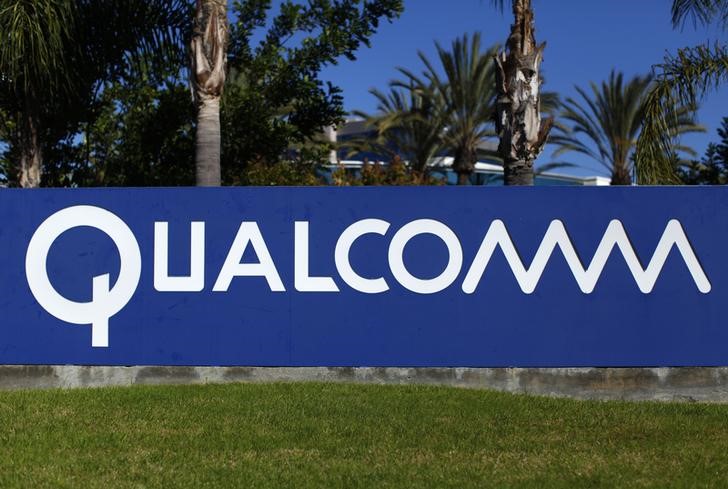By Michael Martina and Matthew Miller
BEIJING (Reuters) - U.S. President Barack Obama pressed China's Xi Jinping during recent talks on the use of Chinese antitrust policy to limit royalty fees for foreign companies, an issue at the heart of a probe into U.S. mobile chipset maker Qualcomm Inc.
The move by Obama to admonish China against applying its anti-monopoly law to benefit Chinese firms using foreign companies' technology will be a key test of how much influence he can wield on these issues as Qualcomm's case nears conclusion.
"The United States government is concerned that China is using numerous mechanisms, including anti-monopoly law, to lower the value of foreign-owned patents and benefit Chinese firms employing foreign technology," Patrick Ventrell, White House National Security Council spokesman told Reuters.
"President Obama raised these concerns about the enforcement of China's anti-monopoly law directly with President Xi when they met in Beijing last month."
At least 30 foreign firms, including San Diego-based Qualcomm, have come under the scrutiny of China's 2008 anti-monopoly law, which some critics say is being used to unfairly target non-Chinese companies.
China's efforts to expand high-speed 4G networks is driving demand for smartphones with leading-edge technology, but Qualcomm's prospects have been hampered by the National Development and Reform Commission's (NDRC) 13-month investigation into the firm.
Two sources familiar with the discussions said Obama did not directly mention the company's name, though Qualcomm is the only major ongoing antitrust case in China involving a U.S. company and royalty fees.
An imminent decision in the case could force the company to pay fines potentially exceeding $1 billion and require concessions that would hurt its highly profitable business of charging licensing fees on phone chipsets that use its patents.
It is unusual for specific commercial cases to be raised at the presidential level, underscoring the importance Washington places on China's investigation.
That the controversy over antitrust practices has been elevated to the level of presidential talks shows how the issue has become a centerpiece of commercial frictions between the world's two largest economies.
"I will not speculate on how the U.S. might react to any hypothetical outcome of a specific case," Ventrell, from the White House, said.
Obama's comments to Xi mirrored those in a letter sent earlier this year by U.S. Treasury Secretary Jack Lew to Chinese Vice Premier Wang Yang, who is set to meet U.S. officials in Chicago this week to discuss commercial ties.
The letter said using antitrust policy to lower royalty rates would not be in the interest of Chinese consumers or in the interest of the joint economic relationship, the sources said.
Obama's warnings on the royalties issue raise questions about how Washington will respond if the NDRC requires Qualcomm to significantly lower the rates that its Chinese customers pay to license its chipsets.
"Having raised the issue directly with President Xi, and with his Treasury Secretary having taken the unprecedented step of raising a competition policy enforcement issue with his counterpart, President Obama's credibility is now clearly at stake on this case," said one of the sources on condition of anonymity.
"PRESIDENTIAL INTERVENTION"
Leading international business lobbies have raised alarm over China's antitrust investigations, including complaints they are motivated by Chinese industrial policy goals. China's regulators have said their enforcement is fair and transparent.
A Qualcomm settlement is likely to include the imposition of fines, a significant reduction of licensing fees the company charges Chinese handset manufacturers for phones sold domestically, and the termination of cross-licensing arrangements the company imposes on the manufacturers using its chipsets, according to people familiar with the case.
Qualcomm earned about half of its global revenue of $26.5 billion in China for the fiscal year ended Sept. 28, with a large chunk of profit coming from higher-margin royalties earned from the company's licensing arm.
Analysts have said Chinese regulators are likely concerned about whether Qualcomm is licensing its chipset patents on a non-discriminatory basis.
A Qualcomm representative declined to comment on the presidential talks.
Kenneth Jarrett, President of the American Chamber of Commerce in Shanghai and a former U.S. diplomat, said some Americans might credit Obama for the effort, but there can be no guarantee his request will be received favorably.
"Thus, for the U.S., there needs to be an assessment that presidential intervention will have a meaningful impact," Jarrett told Reuters.
"As for China's leaders, if there is no consequence to ignoring the request, they might take that as a sign of presidential weakness," Jarrett said.
(Reporting by Michael Martina and Matthew Miller in Beijing and Matt Spetalnick in Washington; Editing by Rachel Armstrong)
